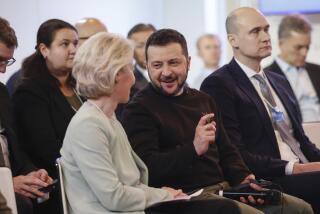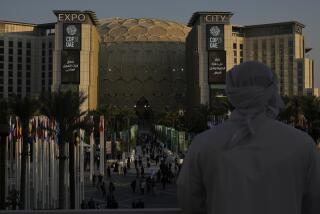Bush Upbeat, Wary on Soviet Economic Bid
- Share via
PARIS — President Bush offered an upbeat response Sunday to what he called Soviet President Mikhail S. Gorbachev’s “fascinating” appeal for Western help for his effort to overhaul his Communist economy.
But in a note of caution, Bush said that the recent sharp improvements in superpower relations do not mean that “everything is hunky-dory between the East and West.”
In a news conference at the end of the annual summit conference of seven leading industrial democracies, the President also said he sees no immediate prospect that the Soviet Union will join the economic summit meetings any time soon.
The Soviets would first have to transform their economy to capitalism and their political system to democracy, Bush told reporters who had assembled in the leafy, sunny garden of the U.S. ambassador’s residence here.
“There’s an awful lot that has to transpire in the Soviet Union, it seems to me, before anything of that nature would be considered,” the President added. “We’re talking about free-market economies here. There was no . . . indication that he will be attending the next summit.”
He also said it would require “a little more time” before he would hold his own summit with Gorbachev. White House Chief of Staff John H. Sununu said earlier on NBC’s “Meet the Press” that such a summit would probably be held between the end of this year and early next summer.
Gorbachev dominated the 15th annual economic summit merely by sending a letter Saturday to French President Francois Mitterrand, the summit’s host, in which he promised to end the Soviet Union’s historic isolation from the world economy and asked for Western help for his effort.
Bush said the letter, which prompted “a great deal of discussion” at the summit, will be given “a very courteous and very thoughtful reply” by Mitterrand.
Asked whether anyone at the summit thought Gorbachev was attempting to make “mischief” by upstaging the proceedings, Bush replied: “I can’t say that that (thought) never occurred.” But he said no one was prepared to say that mischief was indeed Gorbachev’s goal.
The President said the summit leaders concluded that the letter “was just one more manifestation of the changing world we’re living it--that I think was the main message.”
“They’re moving toward our open system, our free system, our system of free elections,” the President said. “And that’s the way I would look at the letter. . . . It was saying, let’s do something in a common way about solving problems around the world.”
The President also reacted warmly to Gorbachev’s expressed goal of a “common home” for all Europeans, although he said that achieving the goal is a long way off. U.S. officials have previously responded more cautiously, out of concern that Gorbachev’s proposal left no room for the United States and the North Atlantic Treaty Organization.
Bush said the seven summit nations, which agreed Saturday to take concerted action to assist Poland, Hungary and other East European nations that take steps toward capitalism and democracy, should encourage similar changes in the Soviet Union, “to the degree the Soviets would not consider that an intervention into their internal affairs.”
“The Soviet economy needs a lot of work,” the President declared. “And I say that not to be critical, but certainly that’s an objective judgment. The economy is in bad, bad shape--far worse shape than the Western economies.”
The President sidestepped a question on whether the Cold War had ended, saying: “I don’t like to use ‘Cold War.’ That has a connotation of worse days in terms of (the) East-West relationship.
“Yet I don’t want to stand here and seem euphoric that everything is hunky-dory between the East and West, on arms or on differences in the economy or on how we look at regional problems. We have some big differences still.”
Not a Popularity Contest
Similarly, he avoided declaring a winner at this year’s summit, his first. He said such questions sound like “who’s more popular, who’s ahead in the poll--Bush or Gorbachev--in Eastern Europe or Connecticut. And it doesn’t really have much to do with that.”
Later, escorting reporters on a tour of the ambassadorial residence, his quarters in Paris, Bush cracked playfully that as for a popularity contest with the Soviet leader in Connecticut, the state where he was raised, “I’d hate to put it to the test.”
Bush said at the news conference that he was “kind of running out of gas” after a week in which he also visited Poland and Hungary. He is scheduled to stop in the Netherlands today before returning to Washington on Tuesday, and he expressed no regret that the summit ended at midday Sunday, half a day earlier than scheduled, because all of the agenda items had been discussed.
Asked whether the leaders couldn’t have found anything else to consider, the 65-year-old Bush cited his fatigue and said:
“It’s been a vigorous experience in physical fitness for me, and I try to stay in pretty good shape. But when you couple the summit with the (French) bicentennial and then tack on Poland and Hungary, I wasn’t about to argue we needed more time, nor was anyone else.”
More to Read
Get the L.A. Times Politics newsletter
Deeply reported insights into legislation, politics and policy from Sacramento, Washington and beyond. In your inbox twice per week.
You may occasionally receive promotional content from the Los Angeles Times.










